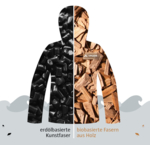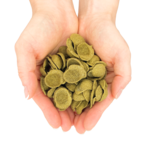-
Project BW2Pro - 29/08/2022
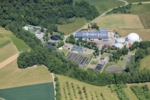
In 2020, Germany’s population collected over 5 million tonnes of biowaste. Most of this was composted, and some was fermented into biogas. Scientists in Baden-Württemberg think there's room for more. Within the project ‘Biowaste to Products’ (BW2Pro) they want to transform biowaste into new products in a biorefinery. The idea is to produce biodegradable plant pots, mulch material, fertilisers, enzymes and biobased plastics in addition to…
https://www.biooekonomie-bw.de/en/articles/news/biowaste-products-biorefinery-transforms-biowaste-new-products
-
Press release - 20/05/2022
The construction industry consumes large amounts of energy resources and produces tons of waste. At the Solar Decathlon Europe 21/22 university competition, students and researchers from KIT are eager to demonstrate that the building sector is already compatible with a functioning circular economy. The task of the interdisciplinary “RoofKIT” team is to convert previously unused roofs of buildings into usable spaces.
https://www.biooekonomie-bw.de/en/articles/pm/roofkit-how-build-recycling-oriented-and-sustainable-way
-
Press release - 06/04/2022
The University of Stuttgart is contributing to innovations for climate protection as part of the EU project "Smart Circular Bridge". An old material is being rediscovered: flax has been with us for thousands of years in the form of clothing, sacks, and robust ship's ropes. Now the plant fibres are experiencing a renaissance and could become the building material of the future.
https://www.biooekonomie-bw.de/en/articles/pm/high-tech-bruecke-mit-flachs-gebaut
-
-
Press release - 02/03/2022
The Ministry of the Environment, Climate Protection and the Energy Sector is funding the KoalAplan project, which extends the functional scope of a wastewater treatment plant. The project, based in the Stuttgart district of Büsnau, aims at recovering raw materials from wastewater and is therefore making a positive contribution to climate neutrality, as the products obtained replace fossil raw materials and energy-intensive processes.
https://www.biooekonomie-bw.de/en/articles/pm/biorefinery-project-koalaplan-extracting-raw-materials-wastewater
-
Press release - 02/03/2022
The Ministry for the Environment, Climate Protection and the Energy Sector is funding the new research project RoKKa which is used to prove the viability of recovering raw materials from wastewater. This adds a crucial function to the scope of a conventional sewage treatment plant. Together with the operators of the sewage treatment plants in Erbach and Neu-Ulm, the project partners demonstrate the positive contribution towards climate protection…
https://www.biooekonomie-bw.de/en/articles/pm/die-klaeranlage-der-zukunft-heisst-bioraffinerie
-
-
Press release - 13/01/2022
Making important raw materials for fine chemicals out of carbon dioxide really works. As part of the Max Planck collaborative project eBioCO2n, a team of researchers from Fraunhofer IGB have successfully performed a first ever fixation of CO2 via a multi-enzyme enzyme reaction driven by electricity yielding a prospective intermediate for the chemical industry. The process for electro-biocatalytic CO2 fixation was recently published and is…
https://www.biooekonomie-bw.de/en/articles/pm/turning-harmful-co2-useful-chemicals
-
Protection against game damage - 13/01/2022
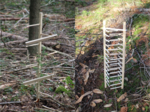
Young forest plants need protecting against damage and as a result it’s often hard to miss the colourful plastic tree guard sleeves when out walking in forests. These tree guard sleeves are neither pleasing to the eye nor sustainable. Bernd Schairer UG from Albstadt has developed sapling protectors made of wood that contain no plastics, metals or chemicals, do not require removal and disposal, and are produced in a socially responsible way.
https://www.biooekonomie-bw.de/en/articles/news/sapling-protectors-made-domestic-wood-simple-effective
-
-
-
-
Dossier - 17/11/2021
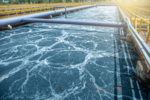
Sustainability is in vogue. And it’s not a question of wanting to be sustainable, but having to be: as the latest report from the Intergovernmental Panel on Climate Change shows, protecting the climate and the environment calls for swift action. Biorefineries that use renewable raw materials and recycle industrial raw materials are playing an important role in the bioeconomy concepts of many countries - including the state of Baden-Württemberg.
https://www.biooekonomie-bw.de/en/articles/dossiers/biorefinery-new-paths-build-our-tomorrow
-
Compostable nappies - 14/10/2021

In an EU-funded project, the Tübingen-based biotech company Novis is working with international partners to develop a fully compostable nappy that contains no plastic parts. This could reduce the huge quantities of used disposable nappies that have been produced to date and the enormous costs of disposal, as well as avoiding the greenhouse gases produced when they are incinerated.
https://www.biooekonomie-bw.de/en/articles/news/nappies-sustainable-bioeconomy
-
-
Specialized in Sustainability - 30/09/2021
The research project RUN (Rural Urban Nutrient Partnership) explores how waste might be used more efficiently as a resource. In this project, Veronika Fendel investigates how recyclable materials from biowaste and domestic wastewater can be fed back into the material cycle in the best possible way.
https://www.biooekonomie-bw.de/en/articles/pm/circular-economy-future
-
-
Press release - 07/07/2021
The European Union is largely dependent on imports of white phosphorus (P4), a strategic raw material for the food and pharmaceutical industries. To tackle this challenge, the newly started four-year EU-funded project FlashPhos – led by the University of Stuttgart – will recover at a large scale high-quality white phosphorus and other raw materials using sewage sludge as input material.
https://www.biooekonomie-bw.de/en/articles/pm/schatzsuche-im-klaerschlamm
-
-
-
-
-
Press release - 18/05/2021
The Bio-based Industries Joint Undertaking (BBI JU) has signed the grant agreements with 18 new projects, selected for funding under the 2020 Call for proposals. 199 beneficiaries from 26 countries across the EU and beyond will receive BBI JU’s financial support worth €104.5 million. This is the seventh and last BBI JU call which will bring the total investment of the initiative to €821.6 million and the BBI JU’s portfolio to 142 projects.
https://www.biooekonomie-bw.de/en/articles/pm/bbi-ju-invest-eur1045-million-circular-bio-based-projects
-
Press release - 03/05/2021
The amount of plastic waste increases every year. Some of this waste is due to plastic packaging used to protect food. As part of the “BioActiveMaterials” project, researchers at the Fraunhofer-Gesellschaft have developed an eco-friendly coating for paper packaging. With this, not only is plastic saved, but the coating of plant-based proteins and waxes also extends the shelf life of the food.
https://www.biooekonomie-bw.de/en/articles/pm/bioactive-paper-coatings-replace-plastic-packaging-foods
-
Website address: https://www.biooekonomie-bw.de/en/search



